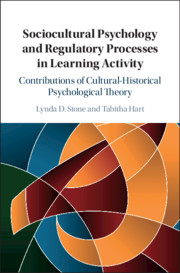 Sociocultural Psychology and Regulatory Processes in Learning Activity
Sociocultural Psychology and Regulatory Processes in Learning Activity Book contents
- Sociocultural Psychology and Regulatory Processes in Learning Activity
- Sociocultural Psychology and Regulatory Processes in Learning Activity
- Copyright page
- Dedication
- Contents
- Figures
- Transcription Excerpts
- Foreword
- Acknowledgments
- Transcription Conventions
- Introduction
- Chapter 1 Cultural-Historical Psychological Theory
- Chapter 2 The Relational Habitus and Regulatory Processes
- Chapter 3 Practical-Moral Knowledge and Regulatory Processes
- Chapter 4 Identity and Competence Woven Together Through Regulatory Processes
- Chapter 5 Contextual Mood and Regulatory Processes
- Conclusion
- References
- Index
Chapter 1 - Cultural-Historical Psychological Theory
Published online by Cambridge University Press: 30 September 2019
- Sociocultural Psychology and Regulatory Processes in Learning Activity
- Sociocultural Psychology and Regulatory Processes in Learning Activity
- Copyright page
- Dedication
- Contents
- Figures
- Transcription Excerpts
- Foreword
- Acknowledgments
- Transcription Conventions
- Introduction
- Chapter 1 Cultural-Historical Psychological Theory
- Chapter 2 The Relational Habitus and Regulatory Processes
- Chapter 3 Practical-Moral Knowledge and Regulatory Processes
- Chapter 4 Identity and Competence Woven Together Through Regulatory Processes
- Chapter 5 Contextual Mood and Regulatory Processes
- Conclusion
- References
- Index
Summary
In Chapter 1, we present an overview of Vygotsky’s cultural-historical activity theory (CHAT), including an explanation of how regulatory processes arise from the routine practices of social life. As part of this overview, we provide an explicit definition of cultural practices. To elaborate how a practice perspective is beneficial for understanding behavioral regulation, we describe how basic elements of an activity theoretic framework capture defining elements of a social practice. This framework offers a useful model for conceptualizing and observing how social practices come into existence and bring/create contextual resources that influence behavioral regulation. These resources are contextually embedded and include such elements as cultural tools, sign systems and symbols, goal-directed activities, and tasks. To better understand how regulatory processes emerge from participation in a community’s valued activities, we offer definitions of self-, other-, and co-regulation from a practice perspective.
Keywords
- Type
- Chapter
- Information
- Sociocultural Psychology and Regulatory Processes in Learning ActivityContributions of Cultural-Historical Psychological Theory, pp. 12 - 30Publisher: Cambridge University PressPrint publication year: 2019
